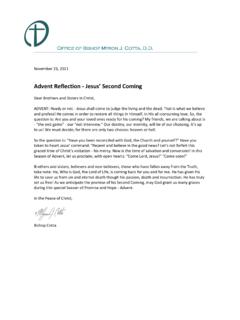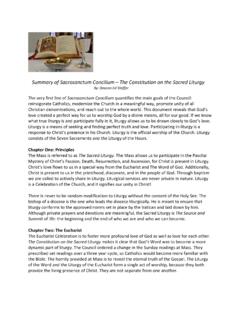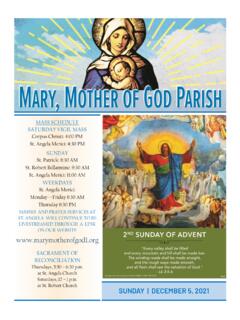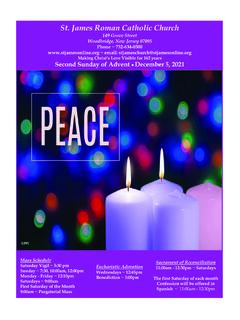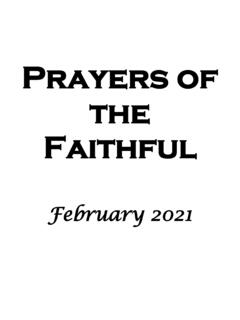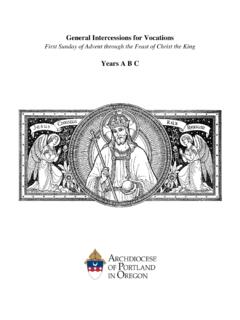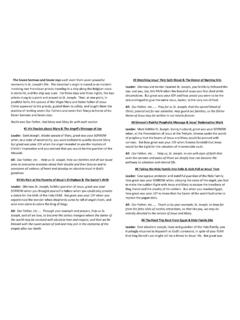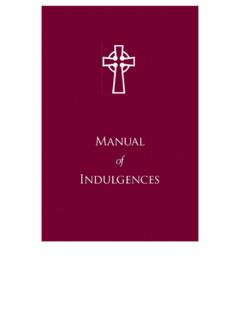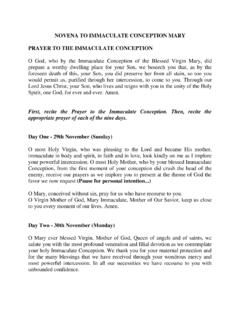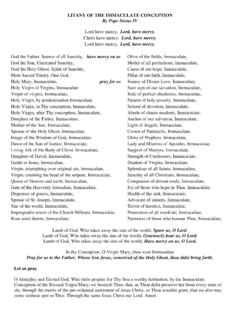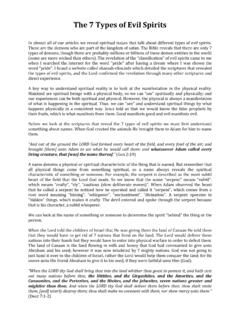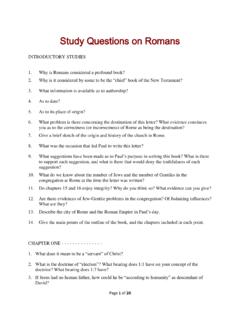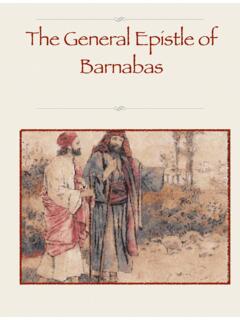Transcription of On the Incarnation
1 On the Incarnation by the IncarnationbySt. AthanasiusMade available to the net by:Paul Halsall into HTML by:Tim Hawes into E-texton March 1, 1998 This book is in the public is not the Incarnation by of ContentsChapter ICreation And The FallChapter IIThe Divine Dilemma And Its Solution In The IncarnationChapter IIIThe Divine Dilemma And Its Solution In The Incarnation --ContinuedChapter IVThe Death Of ChristChapter VThe ResurrectionChapter VIRefutation Of The JewsChapter VIIR efutation Of The GentilesChapter VIIIR efutation Of The Gentiles--ContinuedChapter IXConclusionEnd Notes (End Notes are now the footnotes)Scripture IndexOn the Incarnation by ICreation And The Fall(1) In our former book 1 we dealt fully enoughwith a few of the chief points about the heathenworship of idols, and how those false fearsoriginally arose. We also, by God's grace, brieflyindicated that the Word of the Father is Himselfdivine, that all things that are owe their being toHis will and power, and that it is through Himthat the Father gives order to creation, by Himthat all things are moved, and through Him thatthey receive their being.
2 Now, Macarius, truelover of Christ, we must take a step further in thefaith of our holy religion, and consider also theWord's becoming Man and His divine Appearingin our midst. That mystery the Jews traduce, theGreeks deride, but we adore; and your own loveand devotion to the Word also will be thegreater, because in His Manhood He seems solittle worth. For it is a fact that the moreunbelievers pour scorn on Him, so much themore does He make His Godhead evident. Thethings which they, as men, rule out asimpossible, He plainly shows to be possible; thatwhich they deride as unfitting, His goodnessmakes most fit; and things which these wiseacreslaugh at as "human" He by His inherent mightdeclares divine. Thus by what seems His utterpoverty and weakness on the cross He overturnsthe pomp and parade of idols, and quietly andhiddenly wins over the mockers and unbelieversto recognize Him as in dealing with these matters it is necessaryfirst to recall what has already been said.
3 Youmust understand why it is that the Word of theFather, so great and so high, has been mademanifest in bodily form. He has not assumed abody as proper to His own nature, far from it, foras the Word He is without body. He has been 1 the Contra in a human body for this reason only,out of the love and goodness of His Father, forthe salvation of us men. We will begin, then,with the creation of the world and with God itsMaker, for the first fact that you must grasp isthis: the renewal of creation has been wroughtby the Self-same Word Who made it in thebeginning. There' is thus no inconsistencybetween creation and salvation for the OneFather has employed the same Agent for bothworks, effecting the salvation of the worldthrough the same Word Who made it in thebeginning.(2) In regard to the making of the universe andthe creation of all things there have been variousopinions, and each person has propounded thetheory that suited his own taste.
4 For instance,some say that all things are self-originated and,so to speak, haphazard. The Epicureans areamong these; they deny that there is any Mindbehind the universe at all. This view is contraryto all the facts of experience, their own existenceincluded. For if all things had come into being inthis automatic fashion, instead of being theoutcome of Mind, though they existed, theywould all be uniform and without distinction. Inthe universe everything would be sun or moon orwhatever it was, and in the human body thewhole would be hand or eye or foot. But in pointof fact the sun and the moon and the earth are alldifferent things, and even within the human bodythere are different members, such as foot andhand and head. This distinctness of things arguesnot a spontaneous generation but a prevenientCause; and from that Cause we can apprehendGod, the Designer and Maker of take the view expressed by Plato, thatgiant among the Greeks. He said that God hadmade all things out of pre-existent and uncreatedmatter, just as the carpenter makes things onlyout of wood that already exists.
5 But those whohold this view do not realize that to deny thatGod is Himself the Cause of matter is to imputelimitation to Him, just as it is undoubtedly aOn the Incarnation by on the part of the carpenter that he canmake nothing unless he has the wood. Howcould God be called Maker and Artificer if Hisability to make depended on some other cause,namely on matter itself? If He only worked upexisting matter and did not Himself bring matterinto being, He would be not the Creator but onlya , again, there is the theory of the Gnostics,who have invented for themselves an Artificer ofall things other than the Father of our Lord JesusChrist. These simply shut their eyes to theobvious meaning of Scripture. For instance, theLord, having reminded the Jews of the statementin Genesis,"He Who created them in thebeginning made them male andfemale .. ," and having shown thatfor that reason a man should leave hisparents and cleave to his wife, goeson to say with reference to theCreator, "What therefore God hasjoined together, let no man putasunder.
6 " 2 How can they get a creation independentof the Father out of that? And, again, , speaking all inclusively, says,"All things became by Him andwithout Him came nothing intobeing." 3 How then could the Artificer be someonedifferent, other than the Father of Christ?(3) Such are the notions which men putforward. But the impiety of their foolishtalk is plainly declared by the divineteaching of the Christian faith. From itwe know that, because there is Mindbehind the universe, it did not originateitself; because God is infinite, not finite,it was not made from pre-existent matter,but out of nothing and out of non-existence absolute and utter God brought 2 Matt. 19. 4-63 John 1. 3it into being through the Word. He saysas much in Genesis:"In the beginning God created theheavens and the earth; 4and again through that most helpful bookThe Shepherd,"Believe thou first and foremost thatthere is One God Who created andarranged all things and brought themout of non-existence into being.
7 " 5 Paul also indicates the same thing whenhe says,"By faith we understand that theworlds were framed by the Word ofGod, so that the things which we seenow did not come into being out ofthings which had previouslyappeared." 6 For God is good--or rather, of allgoodness He is Fountainhead, and it isimpossible for one who is good to bemean or grudging about existence to none therefore, Hemade all things out of nothing throughHis own Word, our Lord Jesus Christ andof all these His earthly creatures Hereserved especial mercy for the race ofmen. Upon them, therefore, upon menwho, as animals, were essentiallyimpermanent, He bestowed a grace whichother creatures lacked--namely theimpress of His own Image, a share in thereasonable being of the very WordHimself, so that, reflecting Him andthemselves becoming reasonable andexpressing the Mind of God even as Hedoes, though in limited degree they mightcontinue for ever in the blessed and onlytrue life of the saints in paradise. Butsince the will of man could turn eitherway, God secured this grace that He hadgiven by making it conditional from thefirst upon two things--namely, a law anda place.
8 He set them in His own paradise, 4 Gen. 1. 15 The Shepherd of Hermas, Book II. I6 Heb. 11. 3On the Incarnation by laid upon them a single they guarded the grace and retained theloveliness of their original innocence,then the life of paradise should be theirs,without sorrow, pain or care, and after itthe assurance of immortality in if they went astray and became vile,throwing away their birthright of beauty,then they would come under the naturallaw of death and live no longer inparadise, but, dying outside of it,continue in death and in corruption. Thisis what Holy Scripture tells us,proclaiming the command of God,"Of every tree that is in the gardenthou shalt surely eat, but of the tree ofthe knowledge of good and evil yeshall not eat, but in the day that ye doeat, ye shall surely die." 7"Ye shall surely die"--not just die only,but remain in the state of death and ofcorruption.(4) You may be wondering why we arediscussing the origin of men when we setout to talk about the Word's becomingMan.
9 The former subject is relevant tothe latter for this reason: it was our sorrycase that caused the Word to come down,our transgression that called out His lovefor us, so that He made haste to help usand to appear among us. It is we whowere the cause of His taking human form,and for our salvation that in His greatlove He was both born and manifested ina human body. For God had made manthus (that is, as an embodied spirit), andhad willed that he should remain inincorruption. But men, having turnedfrom the contemplation of God to evil oftheir own devising, had come inevitablyunder the law of death. Instead ofremaining in the state in which God hadcreated them, they were in process ofbecoming corrupted entirely, and deathhad them completely under its dominion. 7 Gen. 2. 16 the transgression of thecommandment was making them turnback again according to their nature; andas they had at the beginning come intobeing out of non-existence, so were theynow on the way to returning, throughcorruption, to non-existence again.
10 Thepresence and love of the Word had calledthem into being; inevitably, thereforewhen they lost the knowledge of God,they lost existence with it; for it is Godalone Who exists, evil is non-being, thenegation and antithesis of good. Bynature, of course, man is mortal, since hewas made from nothing; but he bears alsothe Likeness of Him Who is, and if hepreserves that Likeness through constantcontemplation, then his nature is deprivedof its power and he remains incorrupt. Sois it affirmed in Wisdom:"The keeping of His laws is theassurance of incorruption." 8 And being incorrupt, he would behenceforth as God, as Holy Scripturesays,"I have said, Ye are gods and sons ofthe Highest all of you: but ye die asmen and fall as one of the princes." 9(5) This, then, was the plight of had not only made them out ofnothing, but had also graciouslybestowed on them His own life by thegrace of the Word. Then, turning frometernal things to things corruptible, bycounsel of the devil, they had become thecause of their own corruption in death;for, as I said before, though they were bynature subject to corruption, the grace oftheir union with the Word made themcapable of escaping from the natural law,provided that they retained the beauty ofinnocence with which they were is to say, the presence of the Word 8 Wisdom 6.
